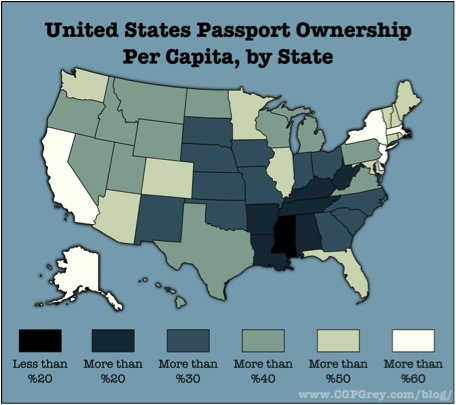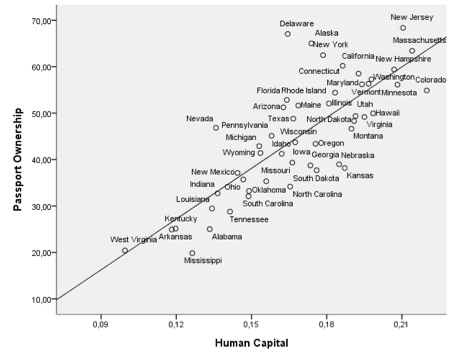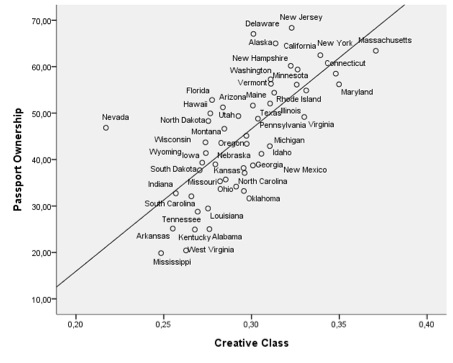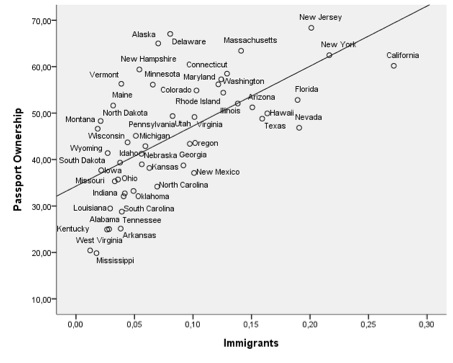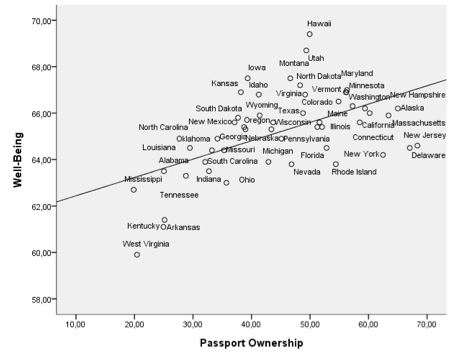America's Great Passport Divide
How income, education, and other factors influence our propensity for globe-trotting
There are Red States and Blue States, rich states and poor states, and Bible and Rust-belt states. But now we must add Globe-trotting and Stay-at-home states to that list too -- that is, according to new data on the percentage of Americans who have a passport. The map below -- which has been getting a lot of attention on-line (via Grey's Blog) -- charts the trend for the fifty states.
New Jersey boasts the highest percentage of passport holders (68%); Delaware (67%), Alaska (65%), Massachusetts (63%), New York (62%), and California (60%) are close behind.
At the opposite end of the spectrum, less than one in five residents of Mississippi are passport holders, and just one in four residents of West Virginia, Kentucky, Alabama, and Arkansas.
It's a fun map. With the exception of Sarah Palin's home state, it reinforces the "differences" we expect to find between the states where more worldly, well-traveled people live versus those where the folks Palin likes to call "real Americans" preponderate. Mostly to entertain myself, I decided to look at how this passport metric correlates with a variety of other political, cultural, economic, and demographic measures. What surprised me is how closely it lines up with the other great cleavages in America today. The statistical correlations generated by my colleague Charlotta Mellander are genuinely striking, among the strongest I have seen for virtually any measure. While my usual caveats stand--our analysis deals with associations only, correlation and causation are not the same thing--the results are intriguing and perhaps provide another window into America's divide.
Let's begin with income. If one assumes that people with more money are more likely to travel overseas, one would be absolutely correct.
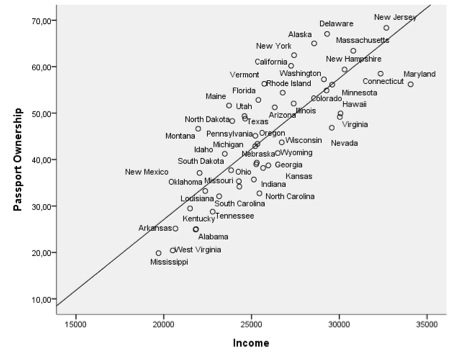
There is a considerable correlation between passports and both median income (.81) and per capita economic output (.70). No matter how you slice it, wealthier states have more passport holders.
It's also reasonable to assume that more highly educated people would be more likely to hold a passport. And that too is what we find across the states. There is a considerable correlation (.80) between passports and human capital levels (measured as the percentage of a population with a bachelor's degree or higher). What's really striking is that this correlation holds even when we control for income, using a statistical procedure called partial correlation analysis.
Passport holding also reflects the structure of state economies. There is a substantial correlation (.70) between the percentage of passport holders and the percentage of the workforce in knowledge-based and creative jobs. Conversely, there is significant negative correlation between passport holders and the share of the workforce in blue-collar working class jobs (-.82). Working class states have considerably less passport holders than creative class states. Again, the correlations hold when we control for income.
States with higher percentages of passport holders are also more diverse. There is a considerable correlation between passports and the share of immigrants or foreign-born population (.63) and also gays and lesbians (.54). The more passport holders a state has, the more diverse its population tends to be. And yes, these correlations hold when we control for income.
What about politics? How does passport holding line up against America's Red state-Blue state divide? Pretty darn well, actually. There is a considerable positive correlation between passports and Obama voters (.59) and a significant negative one (-.61) for McCain voters. It appears that more liberally-oriented states are more globally oriented as well, or at least their citizens like to travel abroad. Again, the correlations hold when we control for income, though they are a bit weaker than the others.
Passport holding also reflects something about the underlying personality of places. American states are not only sorting by income, education and political orientation, but by personality type, according to research by the Cambridge University psychologist Jason Rentfrow and his colleagues. Passport holding is in fact related to three of the five major personality types. There are positive correlations between passports and Openness-to-Experience personalities, and negative ones to both Agreeableness and Conscientiousness. "The results suggest to me that this is also linked to Openness," Rentfrow noted after looking over these findings. "Openness is about curiosity and adventure, so it would make sense that Open places have high numbers of passports."
And finally, states with more passport holders are also happier. There is a significant correlation (.55) between happiness (measured via Gallup surveys) and a state's percentage of passport holders. Yet again, that correlation holds when we control for income.
There are stark cultural differences between places where international travel is common and those where it's not, and we can see them playing out in the cultural and political strife that has been riving the country over the past decades. Think of John Kerry, who was accused of looking and sounding "French" and George W. Bush, who'd hardly been overseas before he became president, or for that matter Barack Obama, with his multi-cultural global upbringing, and Sarah Palin, who had to obtain a passport when she traveled to Kuwait in 2007. The trends in passport use reflect America's starkly bifurcated system of infrastructure. One set of places has great universities and easy access to international airports; another an infrastructure that is much further off the beaten track of the global circulation of capital, talent, and ideas.
Passport holding provides a window into America's big sort--in fact it serves as a robust indicator for all the other things that so divide us.
